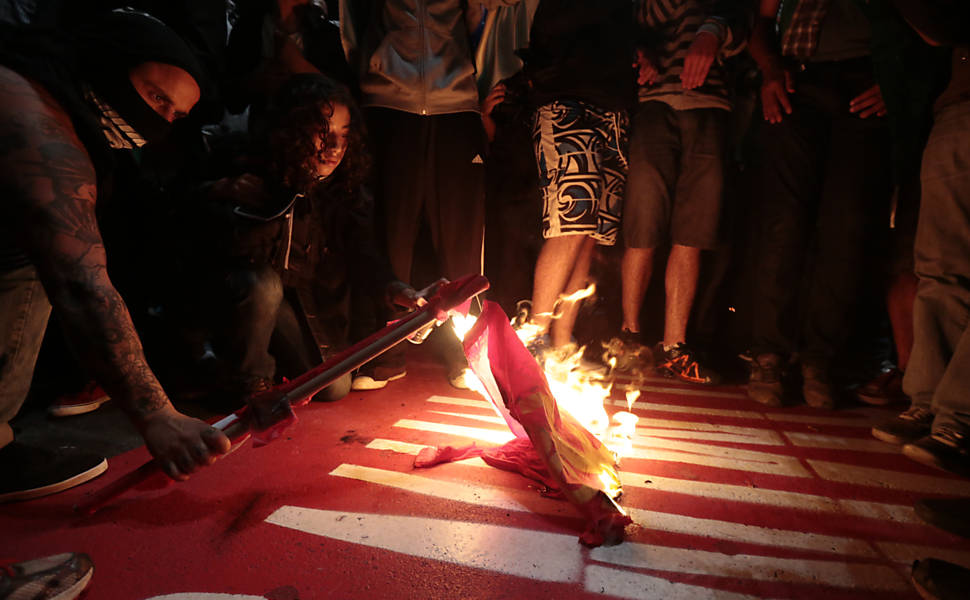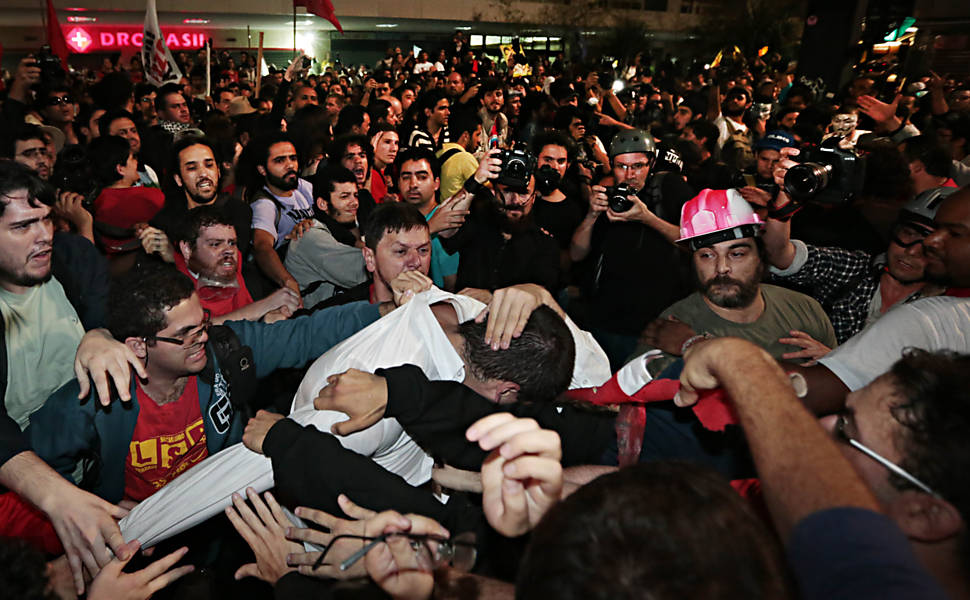Since Claire Rigby grippingly described the nightmare scenes on the street in São Paulo a week ago, things have changed. Last night’s demo had a festive atmosphere, a multiplicity of often confusing demands – and a small group attacking the left-wing parties that had formed the core of the smaller protests last week.
By Claire Rigby
Last night in São Paulo, at the sixth in a series of mass protests that have gripped the city, was weird. On Avenida Paulista, under the glaring streetlights, it was a strange crowd perambulating up and down the boulevard, and the atmosphere felt like the afterglow of an immense festival, or a victorious football match. As riots were kicking off in cities across Brazil, and over a million people took to the streets, on Paulista there were families, people walking their dogs, thousands of the very young (teenagers), and a majority, at least during the time I was present, from about 7.30-9.30pm, with every appearance of being on their first ever march.
But it wasn’t really a march. It was like a Sunday walk in the park. What was odd about it, under the avenida‘s over-bright streetlights, which dazzle as much as they illuminate, was the ubiquity of placards and chants against President Dilma Rousseff, against the former president, Lula, and even the chant du jour, ‘Vem, vem, vem pra rua contra o governo’ – ‘Come out onto the streets against the government.’ Last week, the same chant, to the same rousing rhythm, was: ‘Vem, vem, vem pra rua contra o aumento’ – ‘Onto the streets against the price rise’, referring to the 20¢ increase in public transport fares, the movement’s original demand, which was met on Monday when the fare was returned to R$3.
Obviously, there’s nothing strange about protesters voicing opposition to the government. Inevitably, there’s plenty wrong with this one, with Brazil, and with ‘so many things they won’t even fit on my placard’, as I saw written more than once in the cacophony of handheld, hand-scrawled placards.
But in the context of a mass movement beginning to articulate demands that start from cheap or free public transport, and which progress, many are hoping, to demands for decent education and healthcare, identifying Dilma and Lula as the main targets, as I saw happening the length and breadth of Paulista, seemed naive, to say the very least.
Childish ways
‘Impeach Dilma!’ said a number of placards, amongst many dozens I saw criticising or insulting the president and her party, the PT (Workers’ Party). ‘Anyone not jumping loves Dilma!’ cried a mass of jumping youngsters – teenagers, really. ‘Are they saying, “Anyone not jumping loves Dilma”?’ I asked a guy standing next to me. ‘Yes,’ he smiled. ‘What on earth for?’ I asked. ‘It seems silly.’ ‘He looked at me. ‘It is isn’t it? Muito menineiro‘ – a lot of childishness.
Further down the avenida, it didn’t seem so childish. I saw some people posing ostentatiously outside Starbucks with a huge, professionally printed banner reading ‘Lula, the cancer of Brazil’ (Lula survived cancer a couple of years ago) – posing like a tableau vivant, arranged just so, waiting to have their photo taken by passersby and, presumably, shared. Taking the measure of the crowd as I walked the avenida, I saw people from all walks of life, including a large complement of ‘playboys‘ or ‘coxinhas‘, as rich kids are known here, and a lot of placards declaring their bearers to be against corruption (who isn’t?), and for the impeachment of the president.
Even the hand-writtenness of the placards began to seem a little odd after a while. I’ve never seen a march with so many, and by the same token, I’ve never seen a march with no party-political placards at all. I’m generalizing a little – I saw a small group of people with black-and-red anarchist pennants, whose safety I feared for, having heard of attacks and beatings earlier in the evening, during a march by the PT.

There have been various incidents over the last week of mass protests on the streets of São Paulo, of PT members and activists identifying with other parties being hounded out of demos, threatened and abused for supposedly trying to ‘co-opt’ the movement. It’s a spurious claim that cooler heads and those with a little more experience and understanding of politics, perhaps, have tried to refute, calling for calm and pointing out that those activists were out on the street well before it even occurred to the new wave of protesters to take up their placards. Indeed, until a short time ago, the most common reaction to protest here in São Paulo, and something that has palpably changed in the last two weeks, was instant annoyance and irritation at the interruption to other citizens’ sacred ability to ‘come and go’ – read, to keep the city’s infernal traffic flowing, as if that were a reality even on a good day in São Paulo.
What I saw last night, at least while I was present, was an absence of visible PT presence: I learned later of the extent of the attacks that had been carried out earlier in the evening on a march by PT and other party members. I also saw, amongst the strolling first-timers, the excited teenagers and the seasoned protesters mixing in, watching and wondering, traces of a movement being co-opted, or threatened with it, by a handful of people with their own agendas – people taking advantage of the ‘Brazilian spring’ in to air political views with which none of those out protesting on the nights of the 6th, 7th, 11th and 13th June, would agree with in the slightest. Those were the four nights of smaller demos, which culminated in a particularly immense and savage response by police on Thursday 13th June, following crackdowns on a smaller number of protestors on previous nights.
That excessively violent crackdown – I wrote about it here on From Brazil – was followed by an immense march on Monday 17th that generalised the movement, bringing out tens of thousands in repudiation of the repression, and in support of … something. An elusive, delicate something that is being articulated all over Facebook, and in bars, cafes and workplaces in São Paulo and Brazilwide, in a Tower of Babel of debates and discussions.
Delicate moment
That nascent agenda, still being formed, has radicalized huge swathes of Brazilians, bringing political reflection and discussion into the open in an electrifying way. But its very delicacy and embryonic nature have also opened the way for nebulous discourses ‘against corruption’, ‘for peace’ and indeed, less nebulously, for the impeachment of the president. I even saw a huge banner last night reading, ‘No more taxes’. On a similar note, Vincent Bevins, the editor of this blog, has been questioning vigorously over the last couple of days the reasoning, for the movement, of being drawn into opposition and focusing energy on a Congressional Bill, PEC-37, which changes the way official investigations into fraud and corruption, amongst other things, can be carried out. In advance of last night’s protest, it was being widely touted as the reason for the march, though in the event, there were no more anti-PEC placards that I could see than there were anti-anything-else placards.
There’s an excellent account here (in Portuguese) of the atmosphere last night on Avenida Paulista, including an incident in which the writer, Camila de Lira, saw a boy in a red cardigan being verbally abused. While the wearing of the Brazilian flag last night, and scores of people with their faces painted with green-and-yellow stripes, as if at a football match, seemed more than acceptable, there are numerous reports of people wearing red shirts and T-shirts last night being harassed, verbally abused and even attacked. The boy in red was shouting back, and saying, of the attacks on the PT march earlier, ‘How could you dare to attack the elderly, people who fought against the dictatorship?’
He was referring to the march starting from 5pm yesterday, in which member of the PT but also the Communist Party and other left groups and parties, many in their 70s and 80s, had been booed, shouted at, threatened and even attacked (see the video below, in which a man repeatedly spits insults into the faces of left-wing marchers). On Paulista, according to this report in Folha, members of a range of left political parties were abused by a group of ‘nationalists’ with knives, who threatened to ‘meter a faca’ – stab them. Flags belonging to the PT (the ruling Workers’ Party) and the PSTU (United Socialist Workers’ Party) were taken from marchers and burned on Paulista (see an alarming short film of that, here), and marchers attacked. ‘They are destroying years of struggle,’ said one. ‘We’re not trying to take control of anything – we’re taking part.’ Writing on Facebook, where much of the most electrifying debate, blogging, discussion has been going on, the journalist Camilo Rocha said, ‘Remember: there’s no such thing as a democracy without political parties – that’s dictatorship.’
[youtube l02g_Gn-eAM nolink]
Video above by Vincent Bevins. Notably, the sad-faced man on the far right being jeered by the motorcycle Guy Fawkes is not from the PT, but rather MMPT, the Movement for Housing For All, which organizes occupations of abandoned buildings downtown and was very visible in last week’s protests.
A statement last night by the originators of the protests, Movimento Passe Livre (Movement for Free Public Transport), reads, ‘The MPL is a non-party-political social movement, but we’re not against political parties. We condemn the acts of violence that have taken place against those organisations at the demonstration today, in the same way as we condemn police violence. From the very first protests, these organisations have been part of the mobilisation. What’s “opportunism” is trying to exclude them from the struggle we have constructed together.’
A report in Estado de S.Paulo today says the MPL has decided not to call any more protests in São Paulo due to the participation of groups incompatible with its ideals, ‘such as neofascists’. According to Rafael Siqueira, one of what seems like dozens of voices who speak for the MPL, the plan is to suspend calls for demonstrations while they consider how best to proceed regarding their demands around public transport and urbanism, and also how to deal with the question of activists with objectives contrary to the movement’s ideals.
I saw a girl with a bright pink placard last night saying ‘Brazil! – Don’t let me down’. ‘The giant has awoken’, said dozens of other banners and placards. The question of what success, and what failure, will look like, and what kind of giant o povo – the people – are planning to be, is still up in the air.


